Atherosclerosis -- Is It Reversible? » książka
Atherosclerosis -- Is It Reversible?
ISBN-13: 9783540085829 / Angielski / Miękka / 1978 / 104 str.
Even though numerous questions with regard to the pathogenesis of athero sclerosis have not yet been answered, the accumulated evidence indicates significant regression of lesions in experimental animals. This is discussed extensively in this monograph, as are the mechanisms involved in regression of lesions. Whether human atherosclerosis has the potential for regression appears to be the most important, but at the same time the most difficult question to answer. Contrary to experimental atherosclerosis in animals, which can be produced and which can regress within a few months, human lesions in general develop slowly over many years. Therefore, measures aimed at modifying this process may also require many years to be successful. In addition, repeated direct examination of lesions in the human is usually not possible. Nevertheless, recent reports in patients with hyperlipoproteinemias indicate that pronounced and maintained control of hyperlipidemias may lead, even within months, to regression as evidenced by angiography or sophisticated measurements of peripheral circulation. The monograph is divided into two sections. The first will deal with of lipid deposition in the arterial wall, whether "atherogenesis": mechanisms or not there is evidence of monoclonal origin of human atherosclerosis plaques, cell culture and factors that stimulate smooth muscle proliferation, and animal models of atherogenesis. This section is concluded with a discussion of dietary factors other than lipids in atherogenesis."











